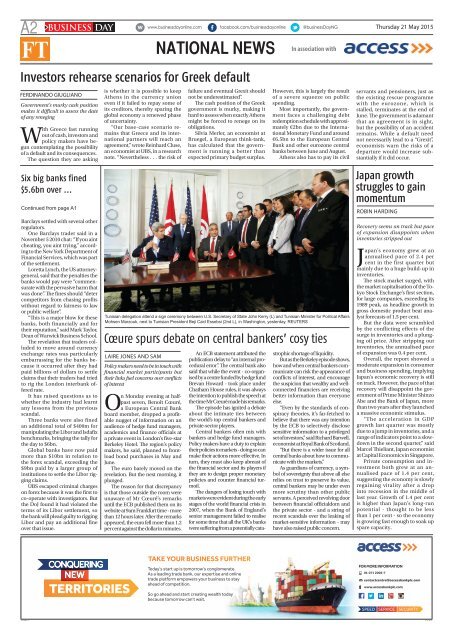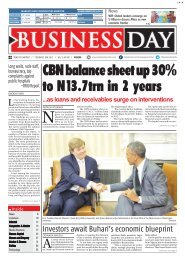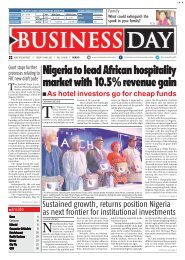business0521
Create successful ePaper yourself
Turn your PDF publications into a flip-book with our unique Google optimized e-Paper software.
Thursday 21 May 2015<br />
A2 BUSINESS DAY<br />
FT<br />
NATIONAL NEWS<br />
In association with<br />
Investors rehearse scenarios for Greek default<br />
FERDINANDO GIUGLIANO<br />
Government’s murky cash position<br />
makes it difficult to assess the date<br />
of any reneging<br />
With Greece fast running<br />
out of cash, investors and<br />
policy makers have begun<br />
contemplating the possibility<br />
of a default and its consequences.<br />
The question they are asking<br />
Six big banks fined<br />
$5.6bn over ...<br />
Continued from page A1<br />
Barclays settled with several other<br />
regulators.<br />
One Barclays trader said in a<br />
November 5 2010 chat: “If you aint<br />
cheating, you aint trying,” according<br />
to the New York Department of<br />
Financial Services, which was part<br />
of the settlement.<br />
Loretta Lynch, the US attorneygeneral,<br />
said that the penalties the<br />
banks would pay were “commensurate<br />
with the pervasive harm that<br />
was done”. The fines should “deter<br />
competitors from chasing profits<br />
without regard to fairness to law<br />
or public welfare”.<br />
“This is a major blow for these<br />
banks, both financially and for<br />
their reputation,” said Mark Taylor,<br />
Dean of Warwick Business School.<br />
The revelation that traders colluded<br />
to move around currency<br />
exchange rates was particularly<br />
embarrassing for the banks because<br />
it occurred after they had<br />
paid billions of dollars to settle<br />
claims that their traders had tried<br />
to rig the London interbank offered<br />
rate.<br />
It has raised questions as to<br />
whether the industry had learnt<br />
any lessons from the previous<br />
scandal.<br />
Three banks were also fined<br />
an additional total of $400m for<br />
manipulating the Libor and Isdafix<br />
benchmarks, bringing the tally for<br />
the day to $6bn.<br />
Global banks have now paid<br />
more than $10bn in relation to<br />
the forex scandal, exceeding the<br />
$9bn paid by a larger group of<br />
institutions to settle the Libor rigging<br />
claims.<br />
UBS escaped criminal charges<br />
on forex because it was the first to<br />
co-operate with investigators. But<br />
the DoJ found it had violated the<br />
terms of its Libor settlement, so<br />
the bank will plead guilty to rigging<br />
Libor and pay an additional fine<br />
over that issue.<br />
is whether it is possible to keep<br />
Athens in the currency union<br />
even if it failed to repay some of<br />
its creditors, thereby sparing the<br />
global economy a renewed phase<br />
of uncertainty.<br />
“Our base-case scenario remains<br />
that Greece and its international<br />
partners will reach an<br />
agreement,” wrote Reinhard Cluse,<br />
an economist at UBS, in a research<br />
note. “Nevertheless . . . the risk of<br />
failure and eventual Grexit should<br />
not be underestimated”.<br />
The cash position of the Greek<br />
government is murky, making it<br />
hard to assess when exactly Athens<br />
might be forced to renege on its<br />
obligations.<br />
Silvia Merler, an economist at<br />
Bruegel, a European think-tank,<br />
has calculated that the government<br />
is running a better than<br />
expected primary budget surplus.<br />
Tunisian delegation attend a sign ceremony between U.S. Secretary of State John Kerry (L) and Tunisian Minister for Political Affairs<br />
Mohsen Marzouk, next to Tunisian President Beji Caid Essebsi (2nd L), in Washington, yesterday. REUTERS<br />
Cœure spurs debate on central bankers’ cosy ties<br />
LAIRE JONES AND SAM<br />
Policy makers need to be in touch with<br />
financial market participants but<br />
their links fuel concerns over conflicts<br />
of interest<br />
On Monday evening at halfpast<br />
seven, Benoît Cœuré,<br />
a European Central Bank<br />
board member, dropped a profitable<br />
nugget of information on an<br />
audience of hedge fund managers,<br />
academics and finance officials at<br />
a private event in London’s five-star<br />
Berkeley Hotel. The region’s policy<br />
makers, he said, planned to frontload<br />
bond purchases in May and<br />
June.<br />
The euro barely moved on the<br />
revelation. But the next morning, it<br />
plunged.<br />
The reason for that discrepancy<br />
is that those outside the room were<br />
unaware of Mr Cœuré’s remarks<br />
until the ECB published them on its<br />
website at 9am Frankfurt time - more<br />
than 12 hours later. After the remarks<br />
appeared, the euro fell more than 1.2<br />
per cent against the dollar in minutes.<br />
An ECB statement attributed the<br />
publication delay to “an internal procedural<br />
error”. The central bank also<br />
said that while the event - co-organised<br />
by a centre funded by hedge fund<br />
Brevan Howard - took place under<br />
Chatham House rules, it was always<br />
the intention to publish the speech at<br />
the time Mr Cœuré made his remarks.<br />
The episode has ignited a debate<br />
about the intimate ties between<br />
the world’s top central bankers and<br />
private-sector players.<br />
Central bankers often mix with<br />
bankers and hedge fund managers.<br />
Policy makers have a duty to explain<br />
their policies to markets - doing so can<br />
make their actions more effective. In<br />
turn, they must also keep abreast of<br />
the financial sector and its players if<br />
they are to design proper monetary<br />
policies and counter financial turmoil.<br />
The dangers of losing touch with<br />
markets were evident during the early<br />
stages of the world financial crisis in<br />
2007, when the Bank of England’s<br />
senior management failed to realise<br />
for some time that all the UK’s banks<br />
were suffering from a potentially cata-<br />
However, this is largely the result<br />
of a severe squeeze on public<br />
spending.<br />
Most importantly, the government<br />
faces a challenging debt<br />
redemption schedule with approximately<br />
€2bn due to the International<br />
Monetary Fund and around<br />
€6.5bn to the European Central<br />
Bank and other eurozone central<br />
banks between June and August.<br />
Athens also has to pay its civil<br />
strophic shortage of liquidity.<br />
But as the Berkeley episode shows,<br />
how and when central bankers communicate<br />
can risk the appearance of<br />
conflicts of interest, and encourage<br />
the suspicion that wealthy and wellconnected<br />
financiers are receiving<br />
better information than everyone<br />
else.<br />
“Even by the standards of conspiracy<br />
theories, it’s far-fetched to<br />
believe that there was any intention<br />
by the ECB to selectively disclose<br />
sensitive information to a privileged<br />
set of investors,” said Richard Barwell,<br />
economist at Royal Bank of Scotland.<br />
“But there is a wider issue for all<br />
central banks about how to communicate<br />
with the markets.”<br />
As guardians of currency, a symbol<br />
of sovereignty that above all else<br />
relies on trust to preserve its value,<br />
central bankers may be under even<br />
more scrutiny than other public<br />
servants. A perceived revolving door<br />
between financial officialdom and<br />
the private sector - and a string of<br />
recent scandals over the leaking of<br />
market-sensitive information - may<br />
have also raised public concern.<br />
servants and pensioners, just as<br />
the existing rescue programme<br />
with the eurozone, which is<br />
stalled, terminates at the end of<br />
June. The government is adamant<br />
that an agreement is in sight,<br />
but the possibility of an accident<br />
remains. While a default need<br />
not necessarily lead to a “Grexit”,<br />
economists warn the risks of a<br />
departure would increase substantially<br />
if it did occur.<br />
Japan growth<br />
struggles to gain<br />
momentum<br />
ROBIN HARDING<br />
Recovery seems on track but pace<br />
of expansion disappoints when<br />
inventories stripped out<br />
Japan’s economy grew at an<br />
annualised pace of 2.4 per<br />
cent in the first quarter but<br />
mainly due to a huge build-up in<br />
inventories.<br />
The stock market surged, with<br />
the market capitalisation of the Tokyo<br />
Stock Exchange’s first section,<br />
for large companies, exceeding its<br />
1989 peak, as headline growth in<br />
gross domestic product beat analyst<br />
forecasts of 1.5 per cent.<br />
But the data were scrambled<br />
by the conflicting effects of the<br />
surge in inventories and a plunging<br />
oil price. After stripping out<br />
inventories, the annualised pace<br />
of expansion was 0.4 per cent.<br />
Overall, the report showed a<br />
moderate expansion in consumer<br />
and business spending, implying<br />
Japan’s economic recovery is still<br />
on track. However, the pace of that<br />
recovery will disappoint the government<br />
of Prime Minister Shinzo<br />
Abe and the Bank of Japan, more<br />
than two years after they launched<br />
a massive economic stimulus.<br />
“The acceleration in GDP<br />
growth last quarter was mostly<br />
due to a jump in inventories, and a<br />
range of indicators point to a slowdown<br />
in the second quarter,” said<br />
Marcel Thieliant, Japan economist<br />
at Capital Economics in Singapore.<br />
Private consumption and investment<br />
both grew at an annualised<br />
pace of 1.4 per cent,<br />
suggesting the economy is slowly<br />
regaining vitality after a drop<br />
into recession in the middle of<br />
last year. Growth of 1.4 per cent<br />
is higher than Japan’s long-run<br />
potential - thought to be less<br />
than 1 per cent - so the economy<br />
is growing fast enough to soak up<br />
spare capacity.<br />
CONQUERING<br />
NEW<br />
TERRITORIES<br />
TAKE YOUR BUSINESS FURTHER<br />
Today’s start up is tomorrow’s conglomerate.<br />
As a leading trade bank, our expertise and online<br />
trade platform empowers your business to stay<br />
ahead of competition.<br />
So go ahead and start creating wealth today<br />
because tomorrow can’t wait.
















